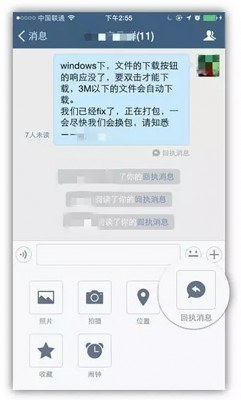
WeChat is building its own Slack
By Eric Crouch for TechinAsia,
Tencent, the company behind China’s wildly popular messenger/digital wallet/everything app WeChat, is planning to launch a new messenger aimed at office workers – and Slack had better watch out.
The company hasn’t yet pegged a definite release date for Enterprise WeChat (企业微信), as it will be called, but there are a few things we know for sure. The program will be free, there will be both mobile and desktop versions, and it will include a number of business specific features.
New features
The WeChat team gave a Q&A on QQ Tech yesterday, and revealed quite a bit about the decisions that went into building Enterprise WeChat.
Like Slack, WeChat Enterprise banks on employees using the service pretty much all day long – it’s not a replacement for email, it’s a replacement for constant workroom chatter. As a result, the service has features like “coffee break” mode to indicate that you’re away from your desk for a moment – because the presumption is, you’re going to be logged on to the service from clock-in to clock-out (and possibly later).

WeChat Enterprise chat screenshot. Image via QQ Tech.
The service also promises to expedite office-related tasks that can easily be settled by sending an automated form between workers, like requesting leave or reimbursements.
Based on the screenshots posted to QQ Tech, many of WeChat’s core messaging features remain intact in the enterprise version. Users can still make groups and send images, voice messages, files, emoticons and stickers, GPS locations, and more.
One notable addition is the “receipt” function, which gives a user the ability to register that they’ve read a message without flooding the group chat with “ok” or “got it” – something common in many chat programs (and Slack), but not presently offered in WeChat.
A prime opportunity
We can expect to see a more complete run-down of WeChat Enterprise’s features as the service gets closer to launch, but the most important aspect of the program is simply that it exists – that Chinese workers will have a separation between the app they use for talking to their family and friends, versus the one they use for work.
Today, if you do business in China, you can expect to have anywhere from two to two dozen WeChat groups devoted to work. These mingle awkwardly with personal contacts and groups, and WeChat’s Moments stream – similar to a Facebook feed – doesn’t do a good job differentiating between work and personal contacts, meaning you may accidentally Like a photo posted by Janice in accounting.
Other companies have tried to break into the work-chat space in China.
Other companies have tried to break into the work-chat space in China. Slack has never caught on in the country, and many businesses are hesitant to rely too heavily on foreign web services, any of which may abruptly be blocked by the country’s zealous censorship apparatus (Dropbox, being a prime example).
We’ve covered some China-focused startups in this area before, like Eko and Teambition. Both services have gone through pretty successful fundraising rounds, and have their own unique takes on the idea of workplace collaboration – Teambition, for example, focuses more strongly on coordinating workers around distinct projects, rather than an open chat. Alibaba has also released a Slack-like service, dubbed Dingtalk, which has been around since 2014. But while the program isn’t exactly obscure, it hasn’t taken the work world by storm.
But while those other services may have interesting features and a fresh take on the field, WeChat has one indomitable advantage: it’s already sitting in essentially every Chinese office worker’s pocket anyway.
The article first appeared in TechinAsia.com





